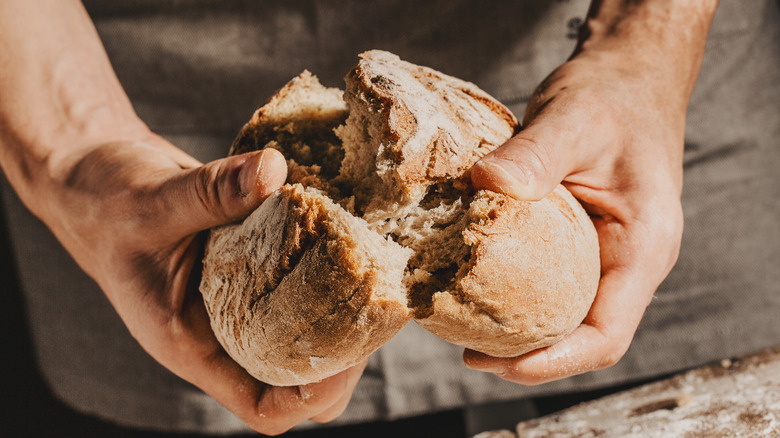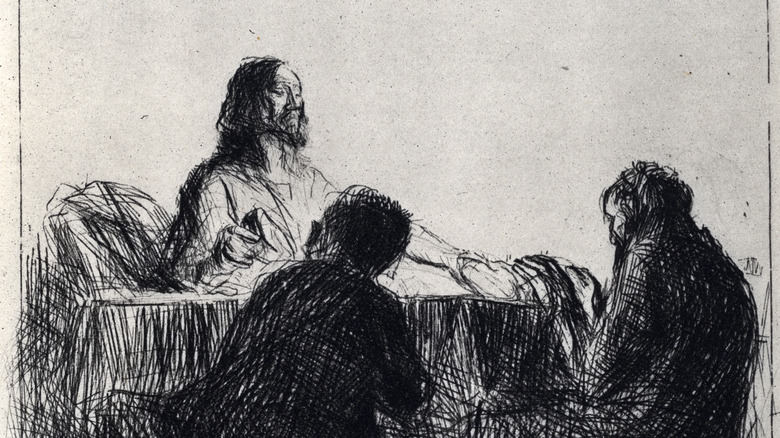Where Does The Expression 'Breaking Bread' Come From?
Bread is not something the world produces naturally. While bread is composed of grains that spring from the earth and water that flows from the rivers or falls from the skies above, it takes a human element to turn these simple ingredients into loaves. Harvesting the wheat, grinding it into flour, mixing it with water, kneading, and baking in an oven is not something nature could do on her own. Unlike vegetables and fruits, which are perfectly nutritious straight out of the ground or off the vine, bread is something so unique to humanity that we have all but built our entire modern culture around it (via Idaho State Journal).
According to Britannica, bread has existed since the Neolithic Age. Developed over centuries into a variety of forms, from the flatbreads of the Middle East and Africa to the tortillas of Latin America, and the rye breads of Europe, bread plays an important role in virtually every diet across the globe. Yet, the expression "breaking bread," when viewed in a modern context, doesn't really have anything to do with bread. Sure, taken at face value, the expression quite literally instructs us to break bread. However, that is not the true meaning. While the phrase does garner universal usage, its origin and deciphered meaning are intrinsically linked to two of the world's religions: Judaism and Christianity.
Religious origins
Though "breaking bread" is an idiom commonly referenced as originating in Christianity, it is in early Judaism that the ritual of breaking bread began. According to The Messianic Feast, Jews see the ritual of breaking bread as a progression from natural to spiritual. In scripture, the breaking of bread first came up when God gave the law to Moses to break 12 loaves on the Sabbath. The bread was broken by hand because Jewish law prohibited using knives on the Sabbath. Apart from this, the bread of ancient times was far harder than the soft bread we are familiar with today. Therefore, as one could not tear away at the loaf, breaking the bread was the only way it could be shared amongst a family or group (via Idaho State Journal).
The tradition of breaking bread featured in Christianity when Jesus dined with his disciples. Breaking bread and sharing it with each other during meals was an integral part of their gatherings. The idiom can be found throughout "The Bible" in both The Old and New Testaments. It is where the famous phrase, "It's hard to remain enemies when you've broken bread together" is derived. This particular saying, apart from being linked to the sacrament, carries through to modern secular mentalities (via Wide Open Eats).
Societal significance
The aforementioned phrase "It's hard to remain enemies when you've broken bread together" shows that breaking bread signifies much more than just sharing food together. It has become a deeply personal and societal act of love and reconciliation. When taken at its word, the phrase suggests uniting after being apart. Sharing food, then, is a way to bring people together. We share food with guests to welcome them to our home. We provide food to the less fortunate through food banks, shelters, and personal acts of charity. Breaking bread is about so much more than simply sharing a meal (via Wide Open Eats).
However, it is with our families we most frequently break bread with. Over the course of history, bread became the center of the home, around which families and companions gathered to share in the life-sustaining calories. There is an interesting Latin origin of the word "companion." According to Idaho State Journal, it pairs a word for "with" ("com") with a term for "bread" ("panis"). So to be tied with a companion in matrimony or love literally means to be "with bread" throughout your lives together. It is a societal act of commitment and love, inoculated with centuries of meaning and significance. So the next time you share a meal with someone you love, think of this phrase. Its importance throughout history, and indeed your own life, will make sharing a meal far more important than simple sustenance.


